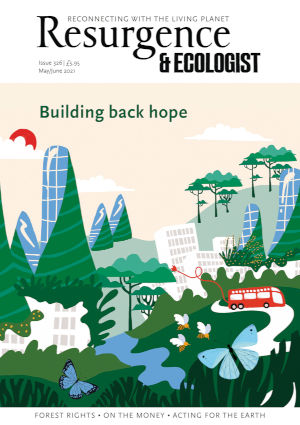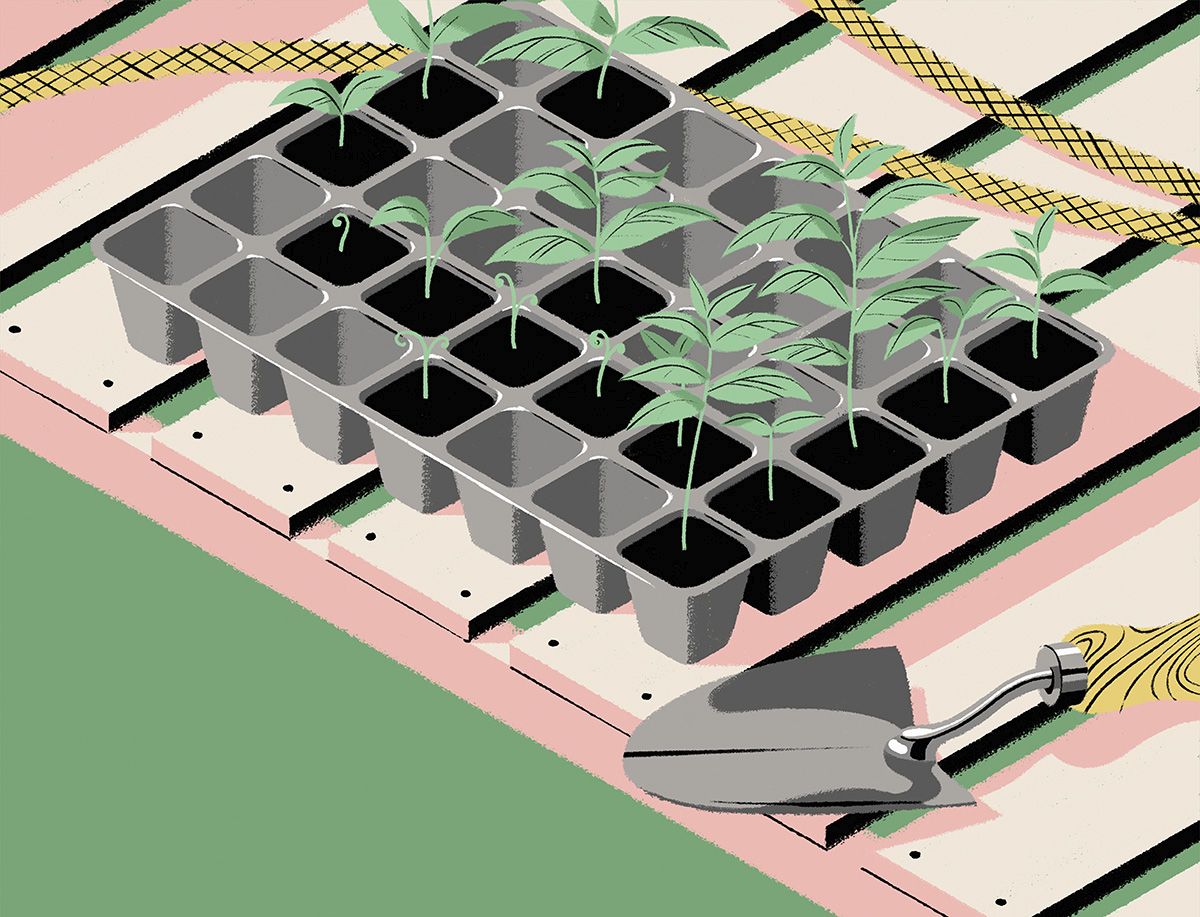Across the world people of all ages have been coming together to address the precarious relationship between us humans and our home planet. Now the onslaught of zoonotic diseases such as Covid-19 has become a further wake-up call. The pandemic has left humanity reeling, causing an existential crisis for billions, and devastating large swathes of national economies. But at the same time people are rediscovering the benefits of a more frugal life. It is surely time to be bold, and to envisage a holistic, green recovery linking human wellbeing with the health of ecosystems via comprehensive, interconnected solutions.
We have much to learn from Nature’s economics, which are very different from our current economic practices. Nature is all about give and take, in a dance of life enabled by sunlight and rain. This circular system, based on photosynthesis, in which all organic wastes are invariably recycled into new life, starkly contrasts with the global, linear takeaway systems we have installed: to take and take, but not to give back. We are on track to depleting and degrading Nature’s resources to a point where human life itself is in question. The response in some quarters: pack our bags and try to make a home on sterile, deep-frozen Mars. How mad is that?
Even before the pandemic, prevailing economic theory and practices, empowered by the ubiquitous combustion of coal, oil and gas, led to market failures of epic proportions, with global pollution and ecosystems destruction largely unaccounted for. The annual hidden costs of our fossil fuel use alone have recently been estimated at US$25 trillion – equivalent to over a quarter of the world’s entire economic output. It turns out that economic growth often turns out to be uneconomic and even cancerous growth.
Our linear use of resources exposes societies and business to many serious, often unforeseen risks. The planetary emergency we face is closely linked to an unprecedented concentration of financial power. Private profits are set against public costs – externalities that are not accounted for, and for which the world’s poorest are now paying the price, exposed to ever more floods and droughts. But most troublesome is the fact that we are leaving our vast, unpaid bills for future generations to pick up, in the form of climate change, resource depletion, pollution and soil damage.
It has long been understood that perpetual economic growth is impossible on a finite planet. The Club of Rome, with its famed Limits to Growth study of 1972, and many articles in Resurgence and the Ecologist since that time have done much to highlight this indisputable perspective. Yet mainstream economists have met it with indifference or even outright denial, often reflecting the interests of commercial enterprises across the globe. Left to their own devices, they won’t deliver a sustainable world. A resurgence of vigorous regional, national and global governance is required, focused on the following interconnected measures:
1. Mainstreaming efficient renewable energy
The global climate emergency requires us to rapidly wean ourselves off fossil fuels. Mainstreaming renewables such as solar, wind and marine energy is a prerequisite for creating a sustainable world. Now, as efficient renewable energy technologies have become cost-competitive with polluting energy systems, we have unprecedented opportunities for doing this. To further speed up green innovation, a fundamental shift of subsidies and fiscal incentives from fossil fuels towards renewable energy is essential.
2. Towards carbon-positive living
The global climate emergency requires of us to reduce excess carbon in the atmosphere by deliberate measures beyond the actions so far agreed by the world’s governments. We need well-resourced global initiatives for the biological storage of billions of tonnes of carbon by protecting and regenerating farmland soils, and marine and forest ecosystems. Such measures, to be agreed with local host communities, will counter climate change and biodiversity loss, and also curtail the spread of zoonotic pathogens.
3. A circular, regenerative economy
Economics, as currently practised, allows for resource exploitation and capital accumulation without wider responsibility. It largely ignores the complex linkages between humans and Nature. We need a new economics, firmly embedded within ecological parameters, that fully accounts for our impacts on Nature, encouraging the continual reuse of resources. Such regenerative, circular economies will stimulate innovation whilst offering a wide range of new business and job opportunities.
4. Planetary health and human wellbeing
Zoonotic diseases such as Covid-19, SARS and AIDS have become a wake-up call, with destruction of biodiversity creating ‘favourable’ conditions for new diseases to arise. Understanding the connections between human health, animal health and the health of the world’s environment is bringing together ecologists and medical professionals as never before. New awareness of these linkages between human and planetary health must surely translate into appropriate international policy frameworks.
5. Regenerative farming
The economics of modern farming favours vast agro-industry enterprises, with humans largely separated from the soil. Reliance on artificial fertilisers and farm chemicals has damaged soils the world over. To secure long-term global food supplies we need to safeguard soil fertility by well-maintained carbon and nutrient cycles. Small family farms still supply much of the world’s food and need our support. And cruel treatment of farm animals, linked to reliance on meat-based diets, can’t be accepted as the global norm.
6. Reviving local economies
Economic globalisation has undermined local economies and community living, yet we know that local cooperation leads to social cohesion and resilience and is a powerful way to deal with crisis situations. There is now an urgent need for local economic renewal, prioritising local production for local consumption, and minimising the need for production based on long-distance transport. The worldwide growth of social networks offers unprecedented scope for cooperating globally to revive local economies.
7. Beyond GDP
GDP, as the standard measure of national financial wellbeing, is highly misleading. Crucially, it does not subtract things that are detrimental to human wellbeing. For instance, the costs of fighting Covid-19 are added up as a contribution to GDP rather than a vast expense funded by government borrowing. The world community needs to agree a comprehensive, alternative indicator, reflecting all aspects of national wellbeing as well as the costs of resource depletion, pollution and climate change.
8. Less trade in products, more exchange of ideas
In recent decades, global trade has proliferated. But its fragility is becoming increasingly apparent, most clearly seen in frequent supply-line interruptions in global, just-in-time manufacturing depending on polluting, fossil-fuel-based transportation. Furthermore, global trading systems often rely on exploitation of cheap labour and unsafe working practices. As routine global trade in products comes increasingly under question, could there be a new emphasis on stimulating a global exchange of ideas?
9. Finance for good
Across the world, money has been our master, not our servant. The apparent fragility of global financial systems requires new agreements to assure that money is generated and used for the benefit of all. In a planetary ecological emergency, we also need a profound shift of expenditure from military towards environmental security – prioritising adequate water, nutrition, healthcare, shelter, and existential human wellbeing.
10. Consumption: from efficiency to sufficiency
Living under Covid-19 lockdown has encouraged many of us to go back to basics, with more frugal lifestyles being practised by many. Can we learn to live better on less? Limits to growth also means limits to individual consumption, based on an understanding that the steady global flow of resources has major environmental and social consequences. How can we assure a better distribution of resources across the world, whilst defining suitable limits to the fulfilment of human needs?
11. Tax shifting
We need to address the failure of markets to properly consider and account for environmental externalities. A taxation system that rewards ‘goods’ and penalises ‘bads’ is long overdue, aiming to facilitate an efficient, regenerative, high-employment economy sustained by prudent use of natural capital. Specifically, taxes need to progressively shift from labour to resource use, countering pollution and waste, and promoting efficient, clean production systems, whilst enhancing social welfare and jobs.
12. Creating regenerative cities
We are building an urban future, with cities as powerhouses of national economies. Their unprecedented resource demands are threatening the very future of humanity and the world’s living systems. Are there ecological limits to urbanisation? The linear economic metabolism of cities needs to come in line with Nature’s circular economy and regenerative capacity. The widely touted Green New Deal needs to centre on building urban economies that help regenerate, not deplete, ecosystems.
This brief sketch is intended to stimulate discussion on a fundamental rethink of the economic systems we adhere to. The creative energy of a new, vigorous coalition of young campaigners and seasoned older voices is now focused on defining the outlines of a regenerative civilisation. Turning words into appropriate action, local and global, has become the heart of the challenge we face.
A shortened version of this article appeared in the printed edition of issue 326 of Resurgence & Ecologist magazine.







